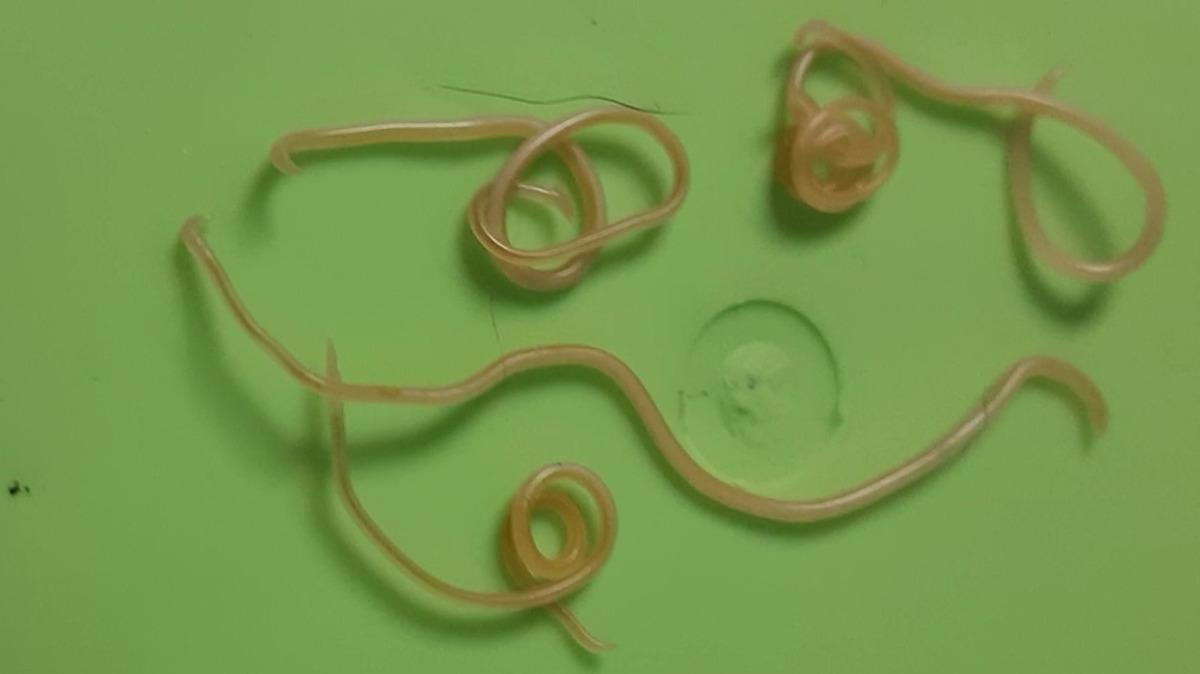Roundworms in Dogs and Cats

- posted: Aug. 20, 2022
Roundworms in Dogs and Cats
Roundworms are one of the most common parasites in companion animals. These intestinal parasites can infect dogs and cats but humans can also get roundworm infections. Let’s learn more about how to prevent these parasites in our pets AND ourselves!
The most common roundworms are those of the species Toxocara. Eggs are microscopic and are passed in the stool. Adult worms are visible to the naked eye and look like long pieces of spaghetti.
Dogs and cats can become infested with roundworms in a number of ways: ingesting an infected prey animal such as a rabbit or rodent, before birth through the mother’s womb, shortly after birth through mother’s milk, and by ingesting poop or dirt containing roundworm eggs. Think indoor only pets aren’t at risk? Unfortunately, even strictly indoor dogs and cats can sometimes become infected with roundworms due to exposure/ingestion of insects such as flies or crickets who can have roundworm eggs in or on them, from the soles of our shoes tracking in roundworm eggs from infected soil and through houseplants and potting soil. An estimated 15% of potting soil contains roundworm eggs!
As you can see, it’s difficult to avoid potential roundworm infection. What do roundworms do to our pets? Most roundworm infections are mild—the worms live in the intestine taking nutrients from the host. They can cause diarrhea and a poor haircoat. More severe infections can lead to anemia and death, especially in very young animals. Roundworms can also travel from the intestine through body tissues, encysting in muscle, liver and other organs.
How do people become infected? Children are more likely than adults to be infected. The most common form of transmission is accidental ingestion of contaminated dirt or sand or feces. Occasionally, if an infected dog or cat licks our mouth or face, worm eggs could be transmitted. In humans, worm migration through tissue is what leads to serious disease. About 10,000 cases of roundworm infections in people are reported each year in the United States and 1.4 billion worldwide. Most people won’t have symptoms but some people may have coughing or liver problems if worms migrate through the liver or lungs. A specific form of problem can occur if a roundworm migrates into the eye. This is called ocular larval migrans and can cause blindness in children.
Because of these potentially serious health threats to people, proper treatment and prevention of roundworm infection in our pets is so important. Treating puppies and kittens with appropriate dewormer every few weeks and starting a monthly heartworm and parasite prevention product like Sentinel or Revolution at 8 weeks or older and continuing through the life of the pet will help purge any worms acquired over the course of the month.
Be sure to use good hygiene as well—keep the yard clear of poop/scoop daily and properly dispose of dog feces. Clean cat litter pans daily as well. Wash hands well after handling dog or cat feces and after gardening and be sure to wash children’s hands especially after playing outside. Keep sandboxes covered to prevent cats from using them as a litter box.
Roundworms are common and do not always cause serious disease, but the potential for infection of humans in addition to our beloved pets makes prevention an important part of pet ownership. Talk to your vet about parasite prevention if your dog or cat is not routinely being treated.
This blog brought to you by the Patton Veterinary Hospital serving Red Lion, York and the surrounding communities.
https://www.cdc.gov/parasites/resources/pdf/roundworms_hookworms.pdf
Location
Patton Veterinary Hospital
425 E Broadway
Red Lion, PA 17356
